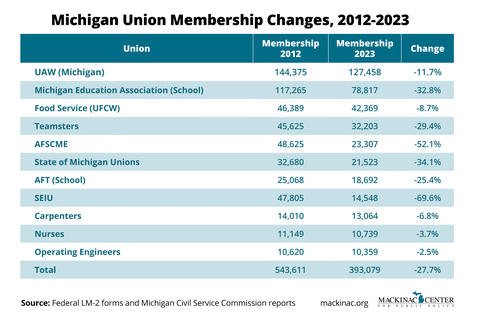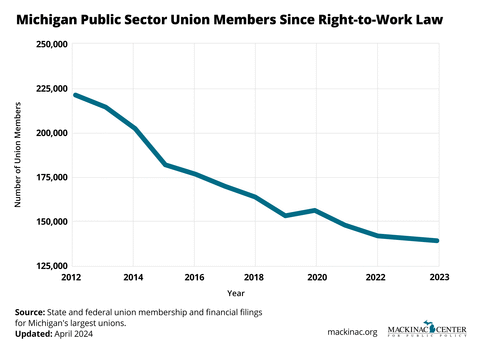
Senators Hertel and Santana (both Democrats) have introduced tie-barred Senate Bills SB 790 Home Help Caregiver Council Act and SB 791 (untitled) to subsidize the Service Employees International Union (SEIU) with a raid on the meager earnings of Michigan home health care workers. This payoff to the Senators' masters at SEIU will come just in the nick of time to backfill the SEIU treasury, after they spend the promised $ 200 million to re-elect President Joe Biden this year.
These two brave defenders of democracy are deviously subverting the will of the people of Michigan, who defeated Proposal 2012-04; a constitutional amendment which would have mandated dues skimming had it passed:
Michigan Senate bills would revive dues skim for home health workers
Government employees can opt out of unions, but Senate Bill 790 would make it much harder
By James David Dickson | March 16, 2024Share on FacebookShare on XState Sen. Kevin Hertel, D-St. Clair Shores, has sponsored a bill that would revive a “dues skim” in Michigan. (Screenshot: Michigan Senate TV)
If you’re not familiar with the phrase “dues skim,” that’s because it was a battle fought and won more than a decade ago.
Years before dues skim went away, home health workers — often people taking care of loved ones who cannot take care of themselves — would realize that their paychecks were light.
Then they found out why: They were paying a union they never signed up for or received benefits from. Dues were being skimmed from their paychecks, and nobody even bothered to ask. That practice was put to rest in 2013.
But the old days of dues skim would return under Senate Bill 790, which was submitted Thursday by Sen. Kevin Hertel, D-St. Clair Shores.
Officially, the 15-page bill says it would create the Home Health Caregiver Council, a seven-member board that would oversee issues involving those workers. The council would set compensation rates and issue checks for home health workers.
It would also be authorized to deduct union fees. Under the previous iteration of dues skim, the Service Employees International Union pulled in about $34 million between November 2006 and February 2013.
The dues skim ended in March 2013, when the SEIU’s contract expired.
“The checks mailed in March are expected to be the last ones from which union dues will be deducted,” CapCon reported back then.
The same day Hertel submitted Senate Bill 790, the SEIU announced plans to spend $200 million to r-elect President Joe Biden.
The new scheme would make opt-outs onerous. Thanks to the 2018 U.S. Supreme Court decision Janus v. AFSCME, government employees have a First Amendment right to opt out of unions. But Senate Bill 790 is not written to make opt-outs easy.
The home health worker who wanted to leave the union would have to ask the union, not the newly created state council. And the union, not the council, would be the one to process the cancellation.
“The council shall rely on information provided by the bargaining representative regarding whether deductions for a labor organization were properly canceled or changed, and the labor organization shall indemnify the council for any claims made by the individual home help caregiver for deductions made in reliance on that information,” reads a portion of the bill.
Senate Bill 790 is tie-barred with Senate Bill 791. That means both must be enacted into law for either to take effect.
Senate Bill 791 changes a law in Michigan that removes caregivers from the definition of “public employee.” That law was enacted in response to the dues skim of the past.
In November 2012, the people of Michigan rejected Proposal 4 of 2012. According to Ballotpedia, the people of Michigan rejected Proposal 4 by a 56-44 margin. The proposal would have allowed in-home care workers to collectively bargain.
MichCapCon lays out more of the big picture here: it's definitely about the money.
Thank goodness for watchdog organizations!
If the graphs don't make it into the post, it's worth your while to check them out in the link.
Michigan’s largest unions have seen plummeting membership over the past decade
Jobs and incomes are up, workplace injuries are down
In recent years, most of Michigan’s largest labor unions saw massive declines in membership, despite significant job growth in most industries. The reason? A decade with right-to-work law, which gave workers the ability to choose whether to join a union, as a member or through a fee, or not.
The reports many labor unions are required to file with the federal government reveal the state of labor union membership, as do reports from the Michigan Civil Service Commission. Every one of Michigan’s 15 largest unions or so has seen a decline, whether in state government, schools, local government, or private industries such as construction or food service. But the declines are uneven. A variety of AFSCME associations, representing mostly state and local government workers, have seen a loss of more than half their members. The SEIU, which mostly represents workers in health care and local government, is down nearly 70%.
Despite job gains in the auto sector over the past decade and a highly publicized strike last year, the UAW branches in Michigan have lost 16,000 members over the past decade. Other private sector unions have seen fewer losses. These include the United Food and Commercial Workers (-8.7%), Michigan Regional Council of Carpenters (-6.8%), the Operating Engineers (-2.5%) and Michigan Nurses Association (-3.7%).
Losses in the public sector are much more pronounced than those in the private sector. The Michigan Education Association has now lost more than 38,000 members, or one-third, since the right-to-work law went into effect in 2013. The American Federation of Teachers branch, the bulk of which is in the Detroit Federation of Teachers, is down more than 25%. The Michigan public school system added 27,000 employees since 2012, but its largest employee unions have lost a combined 45,000 members.
The total number of public sector union members in Michigan has dropped by 80,000 since the right-to-work law was passed. Unions representing state of Michigan employees are down by more than one-third.
That may soon change. The Democratic-led Michigan Legislature repealed the state’s right-to-work law in 2023. The UAW and other unions representing workers for private employers can now require them to rejoin or pay fees. A 2018 ruling from the U.S. Supreme Court means that public sector employees such as schoolteachers still have the right to decline paying or joining a union.
Repealing the law is expected to boost union membership and financial support for the Democratic Party. In fighting in 2012 against a law allowing workers to opt out, SEIU Healthcare Michigan President Marge Faville said unions needed the forced funds to “make sure Democrats get [elected].” Just before legislators voted to enact a right-to-work law, a local Michigan Education Association leader sent an email out on a public server to tell other public school employees that “[emergency management] is the future in Michigan with a Republican governor and Legislature” and union members need to “[get] everyone we know to vote for Democrats.”
In the run-up to the law, opponents of right-to-work claimed there would be dire consequences. President Barack Obama predicted there would be fewer jobs and lower incomes, as did Gov. Gretchen Whitmer (then a state senator) and others. State Rep. Brandon Dillon said “workplace safety accidents” would “skyrocket.” UAW President Bob King said right-to-work would “destroy ... the middle class.”
None of these predictions bore out. From 2012 to 2022, Michigan incomes increased from $55,140 to $61,683, despite the COVID recession — an increase of more than $6,000 per year after inflation. Median household income went from $45,859 to $63,498, or 15% above inflation. Michigan added 382,000 jobs. Occupational injuries declined by 28%.









